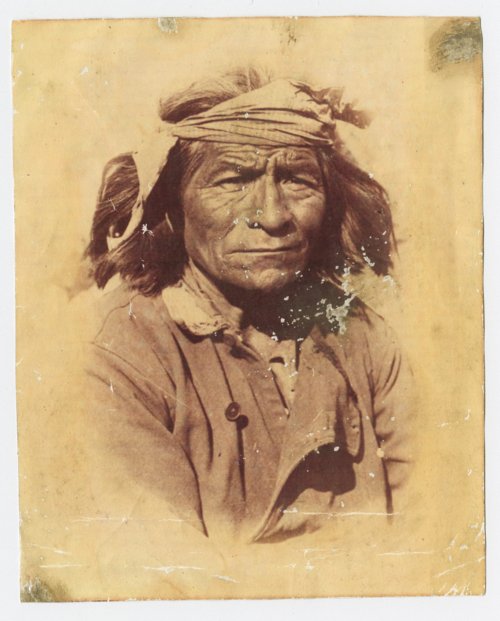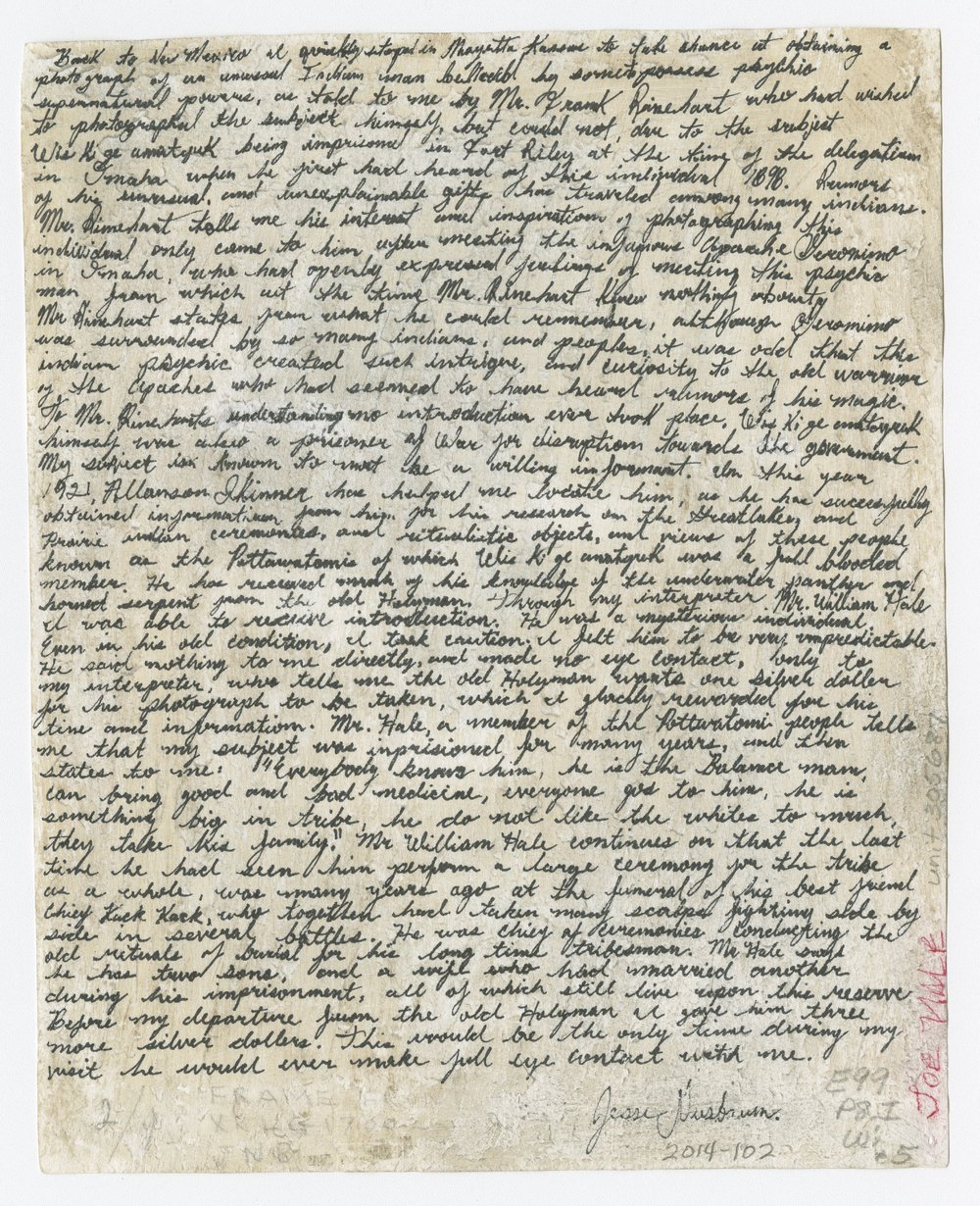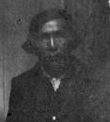

![]()

Above: Potawatomi Holyman, Wis-Ki-Ge-Amatyuk
This is a photograph of Wis-Ki-Ge-Amatyuk who was a chief and holy man in the Potawatomi tribe. Geronimo, who had heard rumors of Wis-Ki-Ge-Amatyuk's magic powers, was intrigued and wanted to meet the chief and holy man. The photograph was taken by Jesse Nusbaum, anthropologist, who visited Wis-Ki-Ge-Amatyuk with William Hale, a Potawatomi interpreter. According to the information written on the back of the photograph, Wis-Ki-Ge-Amatyuk was a prisoner of war for disruption towards the government. He and his brother Wah Quah Bosh Kuk were arrested for refusing to send children from their tribe to an Indian school where they would be Americanized.

Above: Letter from anthropologist and photographer, Jesse Nusbaum. The text on the letter is below:
Back to New Mexico I quickly stoped in Mayetta Kansas to take chance at obtaining a photograph of an unusual Indian man believed by some to possess psychic supernatural powers, as told to me by Mr. Frank Rinehart who had wished to photographal the subject himself, but could not, due to the subject Wis Ki ge amatyuk being imprisoned in Fort Riley at the time of the delegation in Omaha when he first had heard of this individual 1898. Rumors of his unusual, and unexplainable gifts have traveled among many indians. Mr. Rinehart tells me his interest and inspiration of photographing this individual only came to him after meeting the infamous Apache Geronimo in Omaha, who had openly expressed feelings of meeting this psychic man from which at the time Mr. Rinehart knew nothing about. Mr. Rinehart states from what he could remember, although Geronimo was surrounded by so many indians, and peoples, it was odd that this indian psychic created such intrigue, and curiosity to the old warrior of the Apaches who had seemed to have heard rumors of his magic. To Mr. Rineharts understanding no introduction ever took place. Wis Ki ge amatyuk himself was also a prisoner of war for disruption towards the government. My subject is known to not be a willing informant. In this year 1921 Allanson Skinner has helped me locate him, as he has successfully obtained information from him for his research on the Greatlakes and Prairie indian ceremonies, and ritualistic objects, and views of these people known as the Pottawatomie of which Wis Ki ge amatyuk was a full blooded member. He has received much of his knowledge of the underwater panther and the horned serpent from the old Holyman. Through my interpreter Mr. William Hale I was able to receive introduction. He was a mysterious individual. Even in his old condition, I took caution. I felt him to be very unpredictable. He said nothing to me directly, and made no eye contact, only to my interpreter, who tells me the old Holyman wants one silver doller for his photograph to be taken, which I gladly rewarded for his time and information. Mr. Hale, a member of the Pottawatomi people tells me that my subject was inprisoned for many years, and then states to me: “Everybody knows him, he is the Balance man, can bring good and bad medicine, everyone goes to him, he is something big in tribe, he do not like the whites to much, they take his family.” Mr William Hale continues on that the last time he had seen him perform a large ceremony for the tribe as a whole, was many years ago at the funeral of his best friend Chief Kack Kack, who together had taken many scalps fighting side by side in several battles. He was chief of ceremonies conducting the old rituals of burial for his long time tribesman. Mr Hale says he has two sons, and a wife who had married another during his imprisonment, all of which still live upon the reserve Before my departure from the old Holyman I gave him three more silver dollers. This would be the only time during my visit he would ever make full eye contact with me.
Jesse Nusbaum
Above is courtesy of the Kansas State Historical Society. Original owner of the photo and letter above was Joe Hale, tribal member of the Prairie Band Potawatomi, which was donated to the Kansas Historical Society
![]()
Wis-Ki-Ge-Amatyuk
Excerpts from the Kansas Historical Society Collections

Above: Wis-Ki-Ge-Amatyuk (Captain John Buckshot)
Headman of the Shaunques band of the Prairie band of the Potawatomis.
"While the reservation of the Prairie band was well defined by the year 1863, it was by no means so firmly fixed as to be certain of continual existence. It had not become associated as a fixed fact in the minds of the Indians themselves. The vital principle - the idea of communal life - was still uppermost. This was the hope of the band. There existed, however, uncertainty as to the future. There had not yet been the complete assembly at one point of all the members of the Prairie band. Perhaps this never was achieved to the last member. But in 1864 a portion of the band lived on Mill creek, in Wabaunsee county. They were known as Shanques, and their headman was one Captain John (Wis-Ki-Ge-Amatyuk). About the first of August, 1864, some forty of this settlement - men, women and children - went to the Osage and Cherokee country to remain for the winter, and possibly to settle permanently. They were assured by the agent that if they found a country to suit them the government would secure it for them, believing that the whole tribe would be drawn to settle about them.
The Prairie band living on Soldier creek (Jackson county) were also unsettled to some extent. Many of them had gone before the middle of September to Iowa and Wisconsin to spend the winter. It was their intention to return in the spring. At that time there were two causes for the unsettled condition of this band. One was the disturbed condition of the border due to the Civil War. The other was the warlike attitude maintained toward them by the wild tribes, natives to the plains. The Pottawatomies had never succeeded in establishing cordial relations with the plains Indians. As a consequence they could not go into the habitat of the buffalo, the only hope for an adequate supply of meat. This year of 1864 was one of trouble and uncertainty for the Prairie band."
![]()
"The report of Agent Clarke, 1856....This year, Sha-quah, "a bold and influential chief," becoming disgusted with the conduct of affairs affecting the Pottawatomies, led away a band of about one hundred and took up his abode with the Creeks and Cherokees."
![]()
Kansas Historical Society Collections Vol XIV 1915-1918, pp. 539-540
Below is written by L.F. Pearson (United States Indian agent) in 1896 describing the activities of Wis-Ki-Ge-Amatyuk and his brother Wahquahboshkuk along with their traditional followers as they continued to show aggression towards the United States government during the allotment period.
1896.
Agent L. F. Pearson. The issue remained the same in the Prairie band. The progress of the band was paralyzed by the allotment. The agent, of course, favored the allotment plan. He had to favor it to get his office, and he had to favor it to hold his office. His view was the view of the Indian Office and Secretary of the Interior. The following from his report is a fair statement of the conditions, and the agent's explanation of why they existed:
"Were it not for a comparatively small but extremely obstinate and unprogressive element among them, the largest tribe within the agency, the advancement would be yet more marked and satisfactory, but said element exerts an unfavorable influnce upon many members of the tribe that otherwise would identify themselves with the progressive element, and said influence proves decidedly injurious, even beyond their own immediate following. This element still clings to their inherent idea of a 'romantic barbarism,' and it will require years of time and patient care and the exercise of much tact and kindly consideration to bring theem to a full realization of the error of their ways and place them fairly on the way to a level with their more advanced brethren.
"This same element still persistently refuses to recognize their allotments of land in severalty, or the right of the United States government to make such disposition of their lands contrary to their wishes, and they are the means of continuing a feeling of uncertainty among some of the more timid ones as to the permanency of the allotments, thereby hindering some of them from openly acquiescing in said action of the United States government in thus allotting to them, as individuals, their proportion of them resist every effort that has been exerted tending to the placing of the resolve of a minor few, and they have reluctantly acceded, but it produced no effect whatever on the more aggressive of them. Happily, their numbers are comparatively few, and even they are not beyond the power of example and persuasion, and my efforts in their behalf will not be any relaxed."
By L.F. Pearson
United States Indian Agent
![]()